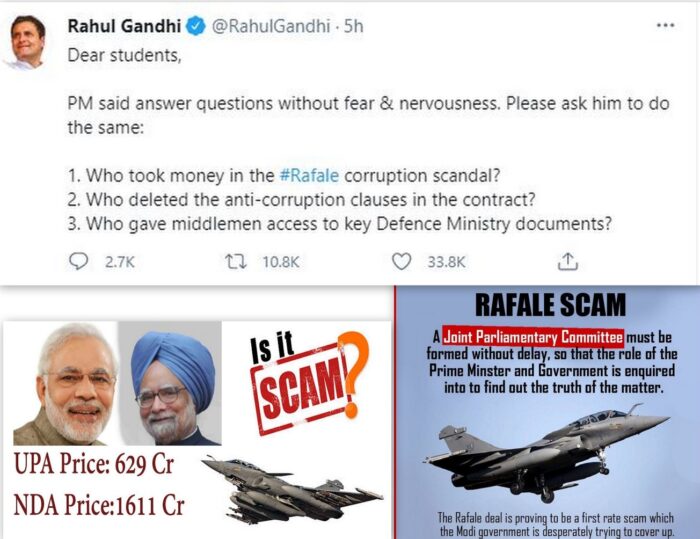INC leader Rahul Gandhi took a jibe at Modi over the Rafael scam. On Wednesday, PM Modi conducted a session of Pariksha Pe Charcha virtually. Responding to the session, INC leader Rahul Gandhi took a swipe at Modi (in the context of the Pariksha Pe Charcha virtual session). Ostensibly addressing the students, Rahul Gandhi stated over Twitter that PM had spoken about asking questions without fear & nervousness. Mr. Gandhi asked the students to pose the following three questions to the PM.
First question: Who took the money in the Rafale corruption scandal?
Second question: Who deleted the anti-corruption clauses in the contract?
Third question: Who gave the middlemen access to the key Defence Ministry Documents?
He also mentioned about the foundation day of NSUI, a body that works for students’ rights.
In a recently disclosed French report, an arms-dealer was mentioned, who had given classified defence documents to the Dassault Aviation. Sushen Gupta, an arms dealer who has been charge sheeted by the Enforcement Directorate in the AugustaWestland VVIP chopper deal had provided classified documents to Dassault Aviation as per information provided by French Media house-Mediapart. One of the documents which were mentioned in the information provided by Mediapart was the Inter-governmental agreement (IGA) which was signed in 2016 for 36 Rafale MMRCA jets.
It was also stated in the three-part Mediapart series, that Defsys solutions, one of the Gupta family’s Indian companies, had invoiced Dassault for 1 million Euros for the production of 50 replica models of the Rafale jet, in March 2017. Intriguingly the Dassault aviation had established offset contract with Reliance Group leading to a JV in 2017 and building of a plant in Nagpur.
Also Read: India’s new Defence Acquisition procedure- offset clause dropped in three types of contracts
Brief Summarization of the revelations by the Mediapart
Indian Negotiating Team (INT) had fixed 5 billion Euros asthefair price for the 36 jets in fly-away condition. Dassault, however, had quoted a price of 10.7 billion Euros for the planes without weapons. This was turned down by the INT. Even when Dassault reduced the price to 7.8 billion Euros, the INT did not find it acceptable. But in September, 2016 the Indian Government agreed to the new price.
While Dassault was paying Sushen Gupta from 2001 onwards, whentheprocurement of fighter jets was first announced by the Indian Government, Gupta was arrested by ED in the Augusta-Westland case known as the Choppergate. Mediapart accessed documents in ED’s charge sheet filed against Gupta.
TheIndian Negotiating Team had thrice insisted on retaining the anti-corruption clauses in the final contract but Dassault each time pressed that the clauses be dropped. While the clauses, still part of the Defence Procurement Rules of the Indian Ministry of Defence, do not provide immunity to middlemen, they allow the Indian Government to cancel the contract if evidence of corruption or payment to middlemen to influence the deal surface. The clauses also empower the Indian Government to demand compensation from the supplier or vendor. But since the clauses were dropped, it will be difficult for India to take any commercial action against Dassault.
French journalist Yann Philippin, whodid the investigation for the last three years for Mediapart, told Indian news portal The Wire that he is convinced that there is enough evidence to warrant a formal investigation into the deal both in France and in India.





